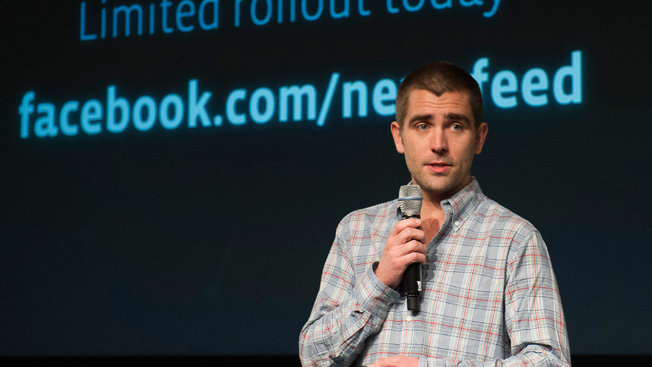After Facebook convinced publishers to go all-in on exclusive content with Instant Articles, it hopes advertisers will do the same.
In a presentation at Cannes Lions this week, Facebook's chief product officer Chris Cox showed ad buyers mock-ups of a new mobile format that takes over a screen after a user clicks on it from the news feed. Once a promo is expanded, it turns into a browsable mini-website. (Re/code published a video of what a Michael Kors ad reportedly looks like.)
Similar to Instant Articles, the format would keep the entire ad experience inside the controlled confines of Facebook, meaning advertisers need to create content specifically for the social platform. The news comes right before Facebook's initial crop of Instant Articles publishers, including The New York Times and Buzzfeed, start cranking out articles for the platform, according to a Wall Street Journal report.
Facebook seems to be turning a corner with mobile ads by creating a more immersive promotional experience. But will brand marketers react by spending more?
"If the mock-up scenario is a preview of what Facebook's ad future is, then the answer is a resounding yes," said Robert Andrade, director of content distribution at Deep Focus. "Rich media ads will definitely change how advertisers spend and, even more so, produce within the Facebook ecosystem. We should expect to see a significant amount of dollars going to early tests."
Andrew Cunningham, social marketing lead at Huge, compared the ads to an interactive-magazine spread. Similar to Instagram's glossy picture and video promos, the amount of effort required of brands depends on how much they are willing to put in. And if the photo app's gradual rollout of ads is any indication, Facebook will take its time making its ads available to a large number of brands and agencies.
"Repurposing content from elsewhere is certainly possible, but it would likely need to be optimized to the format in question and still need to stand out past what's normal for brands to get the most bang for their buck," Cunningham said.
Still, Deep Focus' Andrade noted that Facebook's Instant Articles operatives have worked with publishers to smooth out the production process, and the same would presumably happen with its ad business.
"I suspect a bit of pushback in the short term," he said. "But, long term, these types of executions will become the norm."
VML's managing director of channel activation Amy Worley said the forthcoming ad seems particularly well suited for retailers. And with Facebook's data and retargeting, promos could hit a specific users when they're more likely to buy something.
"An ad format like this has the potential to become much more of a shopping experience," she said. "It offers a wealth of product detail but does so in a way that's user-driven and about exploration rather than pushing out features."
Noah Mallin, MEC's head of social for North America, agreed that the ads have intriguing creative use cases, reminding him of Apple's iAd launch in 2010 but with a wider reach.
"There were wonderful examples of creative executions that made use of the touchscreen and the reading environment, but in practice, they were a minority of the ads that actually ended up getting placed," Mallin said.
Mobile is clearly a key part of Facebook's long-term growth—it makes up 73 percent of its ad revenue—but the new rich-media format shows that the Menlo Park, Calif.-based company can't rely on static sponsored posts to keep ad dollars flowing.
Keeping the entire experience within Facebook would also change how mobile ads are measured. Most campaigns are still analyzed based on clickthrough data, but time spent could be equally as important soon.
Victor Pineiro, Big Spaceship's vp of social media, said the time-spent rationale is part of the reason marketers are increasingly building ad experiences for apps like Snapchat that people can't see elsewhere.
"Facebook's potential new ad format follows the path of social networks becoming 'Hotel Californias'—platforms that you never leave, partially because there are few links leading out, but mostly because you don't seem to want to," he said.
Those new metrics coupled with big, beautiful mobile ads are why execs say Facebook's potential new ad is compelling enough to chip away at TV budgets.
"If you look at mobile-awareness units available to advertisers today, for the most part, they're either highly interruptive to the user or they are a piece of content users can simply scroll past," said Chris Tuff, evp and director of development and partnerships at 22squared. "This new offering is what truly immersive mobile experiences should look like, and it will be vying for both mobile-ad and TV dollars."








